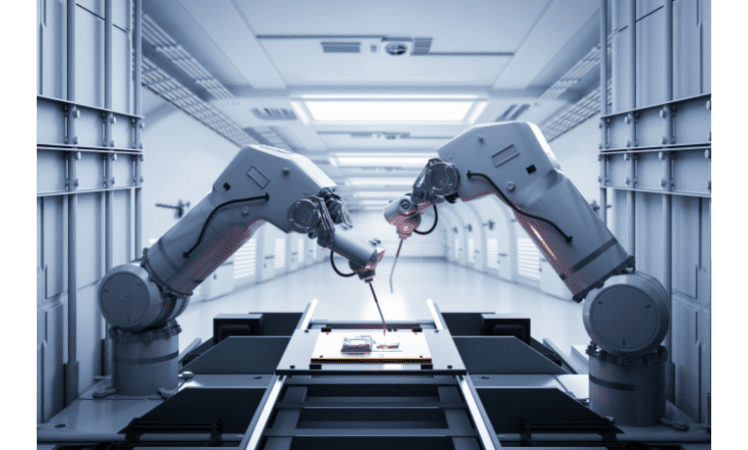
The rise of artificial intelligence (AI) and automation is transforming the world of work as we know it. While these technologies have the potential to increase productivity and efficiency, they also pose a significant threat to jobs, particularly in industries that involve repetitive or predictable tasks. As a result, many workers are left wondering how they will be affected and what they can do to prepare for the future of work.
In this blog post, we will explore the impact of AI on employment and provide a guide for navigating the changes that are taking place. We will discuss the types of jobs that are most at risk, as well as the new opportunities that are being created as a result of these technological advancements. We will also provide strategies for building resilience and staying relevant in an AI-driven job market. Whether you are a worker, a business owner, or a policymaker, this guide will help you understand the challenges and opportunities of the AI revolution, and provide you with practical tips for staying ahead of the curve.
Understand the types of jobs that are most at risk of automation:

One of the key impacts of AI and automation on the job market is the displacement of jobs that involve repetitive or predictable tasks. These jobs are often referred to as “routine” jobs, and they include positions such as data entry, customer service, and manufacturing jobs.
Jobs that involve routine tasks are at the highest risk of being replaced by AI and automation because these technologies are well-suited to perform these types of tasks quickly and accurately. For example, data entry jobs can be automated using optical character recognition (OCR) software, which can quickly and accurately process large amounts of data. Similarly, customer service jobs can be handled by AI-powered chatbots, which can provide quick and accurate responses to customer inquiries.
It’s important to understand that the risk of automation is not limited to certain industries, but it can be found across many sectors. For example, jobs in healthcare, transportation, and finance are also at risk of being automated.
Understanding the types of jobs that are most at risk of automation can help workers and employers prepare for the future of work. They can assess the potential impact on their own job or industry, and take steps to build skills and explore new opportunities.
Learn about the new job opportunities created by AI:

While AI and automation can displace jobs, they also have the potential to create new job opportunities. As these technologies take on more tasks, new job opportunities are emerging in areas such as data analysis, machine learning, and AI development.
Data analysis is one area where new job opportunities are emerging as a result of AI. With the increasing amount of data being generated, there is a growing need for professionals who can analyze and interpret this data to make business decisions. These professionals, known as data scientists, use machine learning and AI techniques to analyze data and predict future trends.
Another area where new job opportunities are emerging is in the field of AI development. As AI becomes more prevalent in society, there is a growing need for professionals who can develop and maintain AI systems. These professionals, known as AI engineers or AI developers, design and implement AI systems, and ensure they are functioning correctly.
Machine learning is another area where new job opportunities are emerging as a result of AI. Machine learning engineers and data scientists are in high demand, as they have the skills to develop, implement and maintain machine learning models that can be used to automate tasks, make predictions and improve decision-making in different industries.
It’s important to note that while these new job opportunities can provide an alternative for workers whose jobs may be at risk of automation, they also require specific skills and qualifications. Therefore, it’s important for workers and employers to stay informed about the new job opportunities that are emerging and take steps to develop the necessary skills and qualifications.
Develop skills in high-demand areas

As the job market changes, it’s important for workers to develop skills that are in high demand. This will help them stay relevant in the job market and increase their chances of finding new employment opportunities.
One area where there is high demand for skills is technology. As AI and automation become more prevalent, there is a growing need for professionals with skills in data science, programming, and digital marketing. Data scientists and machine learning engineers, for example, are in high demand as they have the skills to develop and maintain AI systems and analyze data. Programmers and software developers are also in high demand, as they have the skills to develop the systems and applications that are being used to automate tasks.
Another area where there is high demand for skills is digital marketing. As more and more businesses are moving online, there is a growing need for professionals who can help them reach their target audience and drive sales through digital channels.
It’s important to note that developing skills in high-demand areas is an ongoing process. The job market is constantly changing and new technologies are emerging, so it’s important for workers to stay informed about new trends and take steps to develop new skills throughout their careers.
Additionally, soft skills such as critical thinking, problem-solving, and communication are becoming increasingly important in the job market. They are less likely to be replaced by automation, and they are valued by employers across different industries.
Understand the role of government in shaping the future of work:

Governments have an important role to play in shaping the future of work and addressing the challenges posed by AI and automation. They can create policies and programs that help workers adapt to the changing job market and support the transition to new forms of work.
One example of a government policy that can help workers adapt to the future of work is retraining programs. These programs provide workers whose jobs are at risk of automation with the opportunity to acquire new skills and qualifications. This can help them find new employment opportunities in fields such as data science, programming, and digital marketing.
Another example is job creation initiatives. Governments can invest in industries and sectors that are expected to create new job opportunities, such as renewable energy, health care, or digital technology, to create more jobs and support economic growth.
In addition, governments can also shape social safety net policies to provide a safety net for displaced workers, such as unemployment insurance, retraining programs, and other forms of financial assistance.
It’s important for workers and employers to stay informed about the policies and programs that are being implemented by their government, and understand how they can access and benefit from these resources.
Overall, government policies play a crucial role in shaping the future of work and addressing the challenges posed by AI and automation. They can help workers adapt to the changing job market and support the transition to new forms of work.
Rethink education and training:

As the job market changes, traditional forms of education and training may not be enough to prepare workers for the future. It’s important to rethink education and training to ensure that workers have the necessary skills and qualifications to succeed in the new job market.
One way to rethink education and training is to focus on alternative forms of education, such as online courses, apprenticeships, and on-the-job training. Online courses and other forms of distance learning can provide workers with the opportunity to acquire new skills and qualifications without having to leave their current job. Apprenticeships and on-the-job training can provide workers with hands-on experience and the opportunity to learn from experienced professionals.
Another way to rethink education and training is to focus on lifelong learning. As the job market changes, it’s important for workers to stay updated with new skills and technologies throughout their careers. This can be done through online courses, workshops, and professional development programs.
It’s important for employers also to rethink their approach to education and training. They can invest in employee training programs and provide employees with the opportunity to acquire new skills and qualifications.
In summary, rethinking education and training is crucial for workers and employers to stay relevant in the job market and adapt to the changing landscape caused by AI and automation. Alternative forms of education, such as online courses, apprenticeships, on-the-job training, and lifelong learning can provide workers with the necessary skills and qualifications to succeed in the new job market.
Be open to new career paths:

As the job market changes, it’s important for workers to be open to new career paths and opportunities. With the rise of AI and automation, many jobs that were once considered safe are now at risk of being replaced. This means that workers may need to explore new career paths in order to remain employed and financially stable.
Being open to new career paths can involve taking on new roles within your current industry, or exploring opportunities in new industries altogether. It may also involve acquiring new skills and qualifications through education and training programs.
It’s important to note that exploring new career paths can be challenging and may require making difficult decisions. However, being open to new opportunities can help workers stay relevant in the job market and increase their chances of finding employment that is fulfilling and financially stable.
Additionally, it’s important for employers to also be open to new career paths for their employees and to provide opportunities for them to learn new skills and take on new roles within the company. This can help to retain valuable employees and ensure the company is well-positioned to adapt to changes in the job market.
Overall, being open to new career paths can help workers and employers stay relevant in the job market and adapt to the changes caused by AI and automation. It’s important to be proactive and keep an open mind when exploring new opportunities, and to be prepared to acquire new skills and qualifications when needed.
Embrace lifelong learning:

In a rapidly changing job market, it’s important for workers to embrace lifelong learning in order to stay relevant and competitive. Lifelong learning means continuously developing new skills and knowledge throughout one’s working life.
With the rise of AI and automation, many jobs are becoming obsolete and new jobs are emerging. To stay relevant in the job market, workers need to be able to adapt to new technologies and trends. This requires a commitment to ongoing learning and skill development.
There are many ways to embrace lifelong learning, such as:
Taking online courses and attending workshops to learn new skills and stay updated with new technologies
Joining professional organizations or industry groups to stay informed about new trends and opportunities
Reading industry publications and following thought leaders in your field
Participating in mentorship programs or networking with professionals in your field
Attending conferences or attending webinars to learn about new developments
It’s also important for employers to support their employees’ lifelong learning by providing opportunities for training and development. This can include tuition reimbursement, paid time off for professional development, or internal training programs.
In summary, embracing lifelong learning is crucial for workers and employers to stay relevant and competitive in the job market. It’s important to continuously develop new skills and knowledge throughout one’s working life and to be committed to ongoing learning and skill development in order to adapt to new technologies and trends.
Build a strong professional network:

Building a strong professional network can help workers stay informed about new job opportunities and learn about emerging trends in their field. Networking can also help workers establish connections with other professionals in their field, which can be valuable for learning about new technologies, gaining new perspectives, and finding new job opportunities.
There are several ways to build a professional network, such as:
Joining professional organizations or industry groups related to your field
Attending networking events and conferences in your field
Participating in online communities and forums related to your field
Leveraging social media platforms such as LinkedIn to connect with professionals in your field
Reaching out to your alumni network

It’s also important for workers to actively maintain and nurture their professional network. This can involve staying in touch with existing contacts, following up with new contacts, and providing value to others in your network.
For employers, building a strong professional network can also be beneficial. They can establish connections with other businesses and organizations that can be valuable for finding new customers, partners, and employees.
Overall, building a strong professional network can help workers and employers stay informed about new job opportunities and emerging trends in their field. Networking can also help workers establish valuable connections with other professionals, which can be useful for learning about new technologies, gaining new perspectives, and finding new job opportunities.
Stay adaptable and flexible:

As the job market changes, it’s important for workers to stay adaptable and flexible in order to find new employment opportunities. With the rise of AI and automation, many jobs are becoming obsolete, and new jobs are emerging. This means that workers may need to be open to new opportunities and be willing to make changes in order to remain employed and financially stable.
Being adaptable and flexible can involve taking on new roles within your current industry, exploring opportunities in new industries, and acquiring new skills and qualifications. This may require making difficult decisions and stepping out of one’s comfort zone, but being adaptable and flexible can help workers stay relevant in the job market and increase their chances of finding employment that is fulfilling and financially stable.
For employers, staying adaptable and flexible means being open to change and new ideas, and being willing to make changes in order to adapt to the changing job market. This can involve investing in new technologies, re-skilling employees, and adopting new business models to stay competitive in the market.
Overall, staying adaptable and flexible is crucial for workers and employers to stay relevant in the job market and adapt to the changes caused by AI and automation. It’s important to be open to new opportunities and be willing to make changes in order to remain employed and financially stable.
Emphasize soft skills:

As the job market changes, soft skills are becoming increasingly important. Soft skills refer to a set of personal attributes that enable people to interact effectively with others, such as communication, problem-solving, critical thinking, and emotional intelligence. These skills are less likely to be replaced by automation and are valued by employers across different industries.
Soft skills can be developed through various activities such as taking on leadership roles, participating in group projects, volunteering, public speaking, and mentoring. They can also be developed through education and training programs, such as workshops and courses that focus on communication, teamwork, and leadership.
For employers, investing in soft skills training for their employees can be beneficial as it can lead to improved communication, teamwork and collaboration, increased employee engagement and job satisfaction, and a more productive and efficient workforce.
Overall, soft skills are becoming more important in the job market as they are less likely to be replaced by automation and are valued by employers across different industries. Workers and employers can invest in developing these skills through various activities and education and training programs to increase employability and improve job performance.
Conclusion:
In conclusion, the rise of AI and automation is having a significant impact on the job market. Many jobs that were once considered safe are now at risk of being replaced, while new job opportunities are emerging in areas such as data analysis, machine learning, and AI development. To navigate this changing landscape, it’s important for workers and employers to understand the types of jobs that are most at risk of automation, learn about the new job opportunities created by AI, develop skills in high-demand areas, and understand the role of government in shaping the future of work. Additionally, it’s essential to rethink education and training, be open to new career paths, embrace lifelong learning, build a strong professional network, stay adaptable and flexible, and emphasize soft skills. By taking these steps, workers and employers can increase their chances of finding fulfilling and financially stable employment in the new job market.











